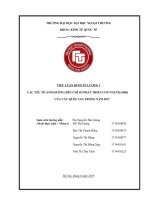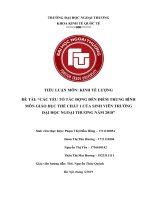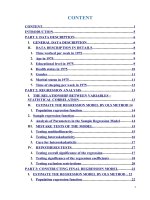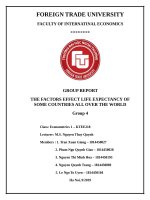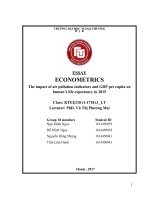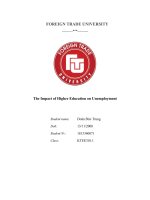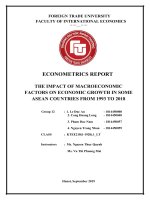tiểu luận kinh tế lượng the effect of variables on foreign direct investment (FDI) is based on data of over 30 countries worldwide
Bạn đang xem bản rút gọn của tài liệu. Xem và tải ngay bản đầy đủ của tài liệu tại đây (724.24 KB, 20 trang )
Group 5_Econometric Report
FOREIGN TRADE UNIVERSITY
FACULTY OF INTERNATIONAL ECONOMICS
=====000=====
REPORT ECONOMETRICS
The effect of variables on Foreign Direct Investment (FDI) is
based on data of over 30 countries worldwide
Class: K57 Japanese Style International Business
Students: Tran Thi Van Anh – 1815520235
Kieu Thu Trang – 1815520231
Pham Thuy Trang - 1815520235
Instructor: Dr. Tu Thuy Anh
Hà Nội – 10/2019
0
Group 5_Econometric Report
Table of Contents
1. INTRODUCTION:..................................................................................................................2
2.
LITERATURE OVERVIEW:.............................................................................................3
2.1 Topic introduction:........................................................................................................... 3
2.2. Literature review:............................................................................................................................. 3
2.3 Procedure and program used............................................................................................5
3. METHODOLOGY:.................................................................................................................5
3.1. Specifying the object for modeling:................................................................................5
3.2. Data gatherings:...............................................................................................................6
3.3. Data description...............................................................................................................7
4. REGRESSION MODEL AND ESTIMATED RESULTS:.................................................8
4.1 Regression function:.........................................................................................................8
4.2. Analysis of correlation between variables:......................................................................8
4.3. Estimation results and the meanings:..............................................................................9
5. HYPOTHESIS TESTING:...................................................................................................10
5.1 Testing an individual regression coefficient:..................................................................10
5.2 Testing the overall significance of the model:................................................................12
6. SUMMARIZE THE RESULT.............................................................................................16
CONCLUSION...........................................................................................................................17
REFERENCES...........................................................................................................................19
1
Group 5_Econometric Report
1. INTRODUCTION:
In today’s world, economy is one of the most meaningful sciences that determine
the social development in general and the national growth in particular. What is
mentioned is that econometrics is an essential subject, involved in any human
resources training, facilitating the development of an economy. The specificity of
econometrics is the demand for quantitative analysis of the economic phenomenon,
the verification of relevant model elements and reliability of the hypotheses, strategy
determination and prediction. All of these important features have made the
econometrics more and more prosperous and closer to economics students. When
studying this subject, students will have a good grasp and acquire the intensiveness
knowledge about the data analysis on the factors that affect the problem. Therefore,
we can set right orientations, develop and find out solution to it.
After a period of learning the basic knowledge of econometrics under the instruction
of lecturer Tu Thuy Anh, our group has obtained a great amount of information, which
significantly helps us to accomplish our report on the topic “The effect of variables on
Foreign Direct Investment (FDI) is based on data of over 30 countries
worldwide“. A foreign direct investment (FDI) is an investment made by a firm or
individual in one country into business interests located in another country. Generally,
FDI takes place when an investor establishes foreign business operations or acquires
foreign business assets in a foreign company. However, FDIs are distinguished from
portfolio investments in which an investor merely purchases equities of foreign-based
companies.
The goal of the investors, especially the private investors when making investment, is
to get as much profit as possible. Therefore, they cannot be satisfied with domestic
market but have to find a way to reach out to foreign markets. In order to penetrate
foreign markets, investors can use many different ways (export, conduct FDI, franchising,
...). The problem for investors is to select the appropriate form of intrusion,
2
Group 5_Econometric Report
bring the highest efficiency and contribute to the goal of maximizing profits. As a
result, our team is working on this topic to identify the factors that affect the use of
FDI in countries by qualifying the relationship between them and the level of FDI.
However, due to the lack of experience and limitation in knowledge and skills, we
might have some mistakes in the report. We would be very grateful to any of your
comments for further improvement.
Thank you!
2. LITERATURE OVERVIEW:
2.1. Topic introduction:
In this modern society, with the strong development of globalization, businesses and
companies often apply FDI to expand markets and find new customers. However, they
can not make decisions without considering some aspects that will have an impact on
FDI, such as Gross Domestic Product (GDP) and Export. Therefore, we decided to
choose the topic ”The effect of variables on Foreign Direct Investment (FDI) is
based on data of over 30 countries worldwide” for our assignment, with a view to
giving a closer look to the relationship between GDP, Export and FDI and draw out
some strategies in using FDI.
2.2. Literature review:
There have been a lot of documents and researches about the relationship between the
three following factors: Foreign Direct Investment, Gross Domestic Product and Export.
Firstly, in terms of the connection of Foreign Direct Investment and Export, Zafar Ahmad
Sultan (2013) said that Foreign Direct Investment (FDI) plays an important role in promoting
export and economic growth of an economy. It is argued that FDI promotes exports of the host
countries by increasing the productivity and productive capacity of the host country by increasing
capital stock, transfer of technology, managerial skills and upgrading the skills of the local
workforce through training. Further, FDI also increases the opportunity for the host countries to
export by facilitating access to the new and large foreign markets.
3
Group 5_Econometric Report
However, despite these, there has not been much study on the relationship between FDI,
export and economic growth. Kishor Sharma (2000) study covers only few years of the
reform period i.e. up to 1997. In order to fill this gap, the present paper tries to examine the
relationship between FDI inflow and exports.
It promotes exports by facilitating the host countries access to customers in global,
regional and home-country markets. In addition, host countries 1 Parent Institute: Assistant
Professor, P.G. Department of Economics, L.S. College, Muzaffarpur, B.R.A.Bihar
University, Muzaffarpur, Bihar, India Journal of Economics and Sustainable Development
sometimes also get benefits of lobbying activities of the MNCs in their home countries for
favorable treatment of exports from their affiliates abroad as happened in case of US, China
etc. FDI also helps in improving productivity of labour force by providing training to the
local workforce and upgrading technical and managerial skills. These activities benefit the
country’s exports through improvement in productivity of the labor force. This is especially
true for export-oriented investments in advanced technological capabilities.
Secondly, FDI plays an important part in affecting GDP as well. Nuzhat Falki (2009)
examined the Impact of FDI on Economic Growth of Pakistan. She collected the data of FDI
from the Handbook of Pakistan Economy - 2005 published by the State of Pakistan and the
World Bank Development indicators - 2008 from 1980 to 2006 with variables of domestic
capital, foreign owned capital and labor force. With the help of endogenous growth theory
and applying the regression analysis she concluded that FDI has negative statically
insignificant relationship between GDP and FDI inflows in Pakistan. Anokye M. Adam &
George. Pardeep Agarwal (2000) founded that the increase in FDI inflows in South Asia
were associated with a many-fold increase in the investment by national investors, suggesting
that there exist linkage effects between FDI and GDP the impact of FDI on GDO growth is
found to be negative prior to 1980, mildly positive for early eighties and strongly positive
over the late eighties and nineties.
However, there were no studies about how Gross Domestic Product and Export affect
Foreign Direct Investment. Therefore, we choose to research on the topic ”The effect of
variables on Foreign Direct Investment (FDI) is based on data of over 30 countries
worldwide” with a view to bring about a new perspective on how these factors affect on
each other the way around. After that, we will draw out some recommendations for the
economists in particular and the whole economy in general. We hope that the readers can
make some comments on our project and continue to develop it in the future.
4
Group 5_Econometric Report
2.3. Procedure and program used
Procedure:
Step 1: Topic Introduction
Step 2: Economic model
Step 3: Econometric model
Step 4: Data collection
Step 5: Estimation of econometric model
Step 6: Check multicollinearity and heteroscedasticity
Step 7: Hypothesis postulated
Step 8: Result analysis & Policy implication
Gretl program is primarily used to analyze the data and run the regression.
3. METHODOLOGY:
As data are provided up front, the economic model used in this report is an
empirical one. Note that the fundamental model is mathematical; with an empirical
model, however, data is gathered for the variables and using accepted statistical
techniques, the data are used to provide estimates of the model's values. Empirical
model discovery and theory evaluation are suggested to involve five key steps, but for
the limitation of purpose and resources, this part of the report only follows three of
them: (1) specifying the object for modeling, (2) defining the target for modeling, (3)
embedding that target in a general unrestricted model.
3.1. Specifying the object for modeling:
(1)
= ( )
As such, this report finds the relationship between Foreign Direct Investment,
which is the object for modeling, and each of relating factors including Gross
Domestic Product and Export.
= (
,
)
5
Group 5_Econometric Report
3.2. Data gatherings:
We use data.worldbank.org, which have been verified to be highly accurate to gather
Data about Foreign Direct Investment, Gross Domestic Product and Export in over 30
countries. The Link will be in the References part. Our data is shown in the following
exhibit:
Exhibit 2: Figure of GDP, FDI and Export in 34 countries (unit: million USD)
6
Group 5_Econometric Report
3.3. Data description
After some discussions as well as taking the meaning of each variable into
consideration, we decided to choose the variables for our regression model as follows:
The dependent variable chosen is the level of FDI in over 30 countries, denoted as
FDI. The independent variables include two factors: the total amount of Gross
Domestic Product (GDP) of each country, denoted as GDP; the total amount of money
gained through Exporting, denoted as Export.
- Dependent variable: FDI
- Independent variables (including 2 variables) :
+ X1 : GDP (million USD)
+ X2 : Export (million USD)
A brief description of each variable is given in Exhibit 1:
Exhibit 2: Description of Variables
7
Group 5_Econometric Report
4. REGRESSION MODEL AND ESTIMATED RESULTS:
4.1. Regression function:
We have one dependent variable, denoted as FDI (Foreign Direct Investment) and
two independent variables, denoted respectively as GDP (Gross Domestic Product),
Export. Thus, we can construct the regression function to demonstrate the relationship
between Y and X as follows:
(PRF):
=
(SRF):
=
̂
0+
̂
+
̂
+
0+
+
+ ̂
Where:
-
0:
intercept of regression model
,: slope coefficients of independent variables
-
ui : Disturbance of regression model
̂
: estimator of
00
-
̂ ̂
,
-
: estimator of,
̂ : residuals (estimator of ui)
4.2. Analysis of correlation between variables:
We use command “correlation matrix” from Gretl to get the table of correlation
between variables as follows:
8
Group 5_Econometric Report
As can be seen from the table:
-
Correlation coefficient between GDP and FDI is -0.4038
-
Correlation coefficient between GDP and Export is 0.9055 > 0.8
- Correlation coefficient between FDI and Export is -0.1685
Correlation coefficient between GDP and Export is 0.9055 > 0.8
Therefore, multicollinearity happens in this model.
4.3. Estimation results and the meanings:
With the data collected, we run the regression model and have the table as follows:
Based on the data collected from the table, we establish the sample regression
function:
(SRF):
FDI = -7110.31 – 0.0223044 GDP + 0.0778029 Export
Meanings of the regression coefficients:
means that when all the independent variables are zero, the expected value of
̂
= -7110.31: the intercept of sample regression equals to -7110.31, which
FDI is -7110.31.
̂
= –0.0223044: the estim ator of sl ope coeffi cient of variable GDP equals
to –0.0223044. This figure indicates that when GDP rises by 1 unit, the
9
Group 5_Econometric Report
expected value of their FDI decreases by 0.0223044, in the condition that
other things are held constant.
̂
= 0.0778029: the estimator of slope coefficient of variable Export equals to 0.0778029. This figure points
out that when Export of goods and services increases by 1 unit, the expected value of FDI increases by
0.0778029, in the condition that other things are held constant.
The meaning of coefficient of determination R
2
The coefficient of determination= 0.378838 indicates that all the independent
variables (GDP, Export) jointly can explains 37.8838% of the variation of the
dependent variable (FDI).
The other factors (except for GDP and Export) can explain 62.1162% of the
variation of the dependent variable (FDI)
Other results
Adjusted coefficient of determination adj R-squared = 0.338763
S.D. dependent var = 38037.11
S.E. of Regression = 30930.43
5. HYPOTHESIS TESTING:
In order to find out whether given observations are compatible with
stated hypothesis or not, we do the hypothesis testing as follows:
5.1. Testing an individual regression coefficient:
5.1.1. The T-test:
10
Group 5_Econometric Report
The purpose of this is to test the influence of independent variable, which includes GDP on the: =
expected
value of dependent
0
variable, which is myopia. In this section, we use two-sided testing with the pair of hypothesis: { 0
≠0
1:
Based on the data collected from Gretl table below, we have:
Testing the coefficient of time:
0:
Firstly, we establish a pair of hypotheses: {
1:
̂
Then we compute: critical =
=0
≠0
32
−0
= −2.497;
= 1.694
0.025
Since | |> 032.025 , we reject H0 , accept H1. In other words, the slope coefficient of variable GDP is different from zero.
11
Group 5_Econometric Report
Conclusion: At the level of significance 5% , the slope coefficient of variable GDP is
statistically significant.
5.1.2. The P-value method
We can also use P-value method to test the coefficient of variables.
Firstly, we have
a pair of hypotheses: {
:
0:
1
=0
≠0
Based on the data from Gretl, it can be clearly seen that:
P-value of GDP = 0.0179
It is smaller than the level of significance ( = 0.05), then we reject H0 and accept H1. Therefore, all the regression coefficients are statistically
significant.
The results we have from P-value are matched with the outcomes from T-test above.
5.2 Testing the overall significance of the model:
This F-test evaluates the null hypothesis that all the coefficients of independent
variables are equal to zero versus the alternative that at least one does not.
/We establish a pair of hypothesis as follows:
12
Group 5_Econometric Report
:β
0
{
1
:β
2
=0
GDP
≠0
2
or equivalent:
=0
0: R
{
:R
≠0
2
gdp
1
(With the significance level: α = 0.05)
Then, we compute the test statistic:
2
=
(−)
(1 −
We have F > F0.05(3,66); therefore, we reject H0 and accept H1.
2)(
F0.05(1,32) = 4.15
− 1)
= 6.236
5.2.1 Heteroscedasticity testing:
We establish a pair of hypotheses as follows:
{
0:
The residuals are homoscedastic
1:
The residuals are heteroscedastic
Then, we use the command “ Breusch-Pagan test for heteroskedasticity ” in Gretl
and have this following result:
13
Group 5_Econometric Report
As can be clearly seen from the table, the P-value associated to the
heteroscedasticity test is greater than threshold (P-value = 0.543 >0.05). Thus, we
cannot reject the null hypothesis that the residuals are homoscedastic.
→
We accept H0 and reject H1
We also use command gretl and have this graph:
We can observe that while the average of the residual is always zero, its spread around
its mean does seem to depend on the area. This is an indication of heteroscedasticity.
A more formal test is a regression of the square of the residuals on the explanatory
variable(s).
14
Group 5_Econometric Report
Heteroscedasticity corrected:
The resulting methodology is called the Weighted Least Squares (WLS) or
sometime it is also referred to the Feasible Generalized Least Squares (FGLS).
You can see that there may be significant changes in the statistics, while the coefficients
are basically the same. The majority of articles report robust statistics and does not do
WLS, partly for convenience, and partly because there is some degree of distrust toward
data that has been altered: all your variables (including the dependent variable) will be
divided by the estimated standard error of the residual for that particular observation.
15
Group 5_Econometric Report
6. SUMMARIZE THE RESULT
After verifying all suppositions, we have table following:
16
Group 5_Econometric Report
CONCLUSION
This report is accomplished on the dedicated contribution of each member and
the knowledge from our study on Econometrics. This also provides us a good
opportunity to practice what we have learned and get a deeper understanding about the
data analysis and relevant testing. After this useful application, we hope that our work
can somehow explain how the GDP and Export have effects on Foreign Direct
Invesment.
The purpose of this research is to demonstrate the role played by FDI in
accelerating GDP growth, so as to know whether the call for more FDI is truly justified.
The flow of FDI has been drastically increased in the last couple of decades making it a
key area for the further research. Increasing attention has been paid in all developing
countries in recent years to answer the question of “how to attract more FDI”. This
emphasis on one side has increased the flow of FDI in the host country and on the other
side it gives rise to uncertainties regarding the profitability analysis of making such
decision. Such as whether the impact of FDI on domestic employment pays more or costs
more? The topic is of great importance because of the advantages that FDI brings to the
home country. One of the main advantage of foreign direct investment is that it helps in
the economic development of the host country where the investment is being made
through; overcoming financial crisis, by permitting transfer of technology, human skills,
intellectual property, enhancing skills of human capital, increasing government’s revenue
through taxation, by creating new jobs, by improving the quality of goods and services
being produced, it boosts the exports sector etc plus there is also some scope for new
research activities. This research will help students can get the grip of FDI on GDP by
understanding the importance of this research which will be a source for the future
research, also making a think tank they can come up with new ideas and provide
consultancy to the local firms and entrepreneurs so that they can merge with MNCs to
gain the knowledge of advanced technologies and skills. Considering the significance of
the topic, this research has been planned. The core purpose of this research study is to
examine the impact of GDP on FDI in general. Due to the inexperience and limitation
17
Group 5_Econometric Report
in knowledge and skills, our report may have some mistakes. We hope the lecturer and
the readers can give some comments so that we can improve ourselves and have a
better work in the future.
Thank you!
18
Group 5_Econometric Report
REFERENCES
1. Damoda N. Gujarati, “Basic economectrics”, fourth edition.
2. World Bank Data,
/>
VNfiUg1Z2bgo8rUeGWTrA78.
3. Qaiser Abbas, Salman Akbar,Ali Shan Nasir, Hafiz Aman Ullah, Muhammad
Akram Naseem, Impact of Foreign Direct Investment on Gross Domestic Product, 8/
2011.
/>
4. Zafar Ahmad Sultan, A Causal Relationship between FDI Inflows and Export:
The Case of India, Journal of Economics and Sustainable Development, 2013.
/>n_FDI_Inflows_and_Export.pdf?response-contentdisposition=inline%3B%20filename%3DJanuary_edition_of_The_International_Ins.pdf&X-AmzAlgorithm=AWS4-HMAC-SHA256&X-AmzCredential=AKIAIWOWYYGZ2Y53UL3A%2F20191017%2Fus-east1%2Fs3%2Faws4_request&X-Amz-Date=20191017T122906Z&X-Amz-Expires=3600&X-AmzSignedHeaders=host&X-AmzSignature=4c4888396f5e9cc2a180d45894695695d34c3b53fb90c660f63aec5ac919c4d1
19


